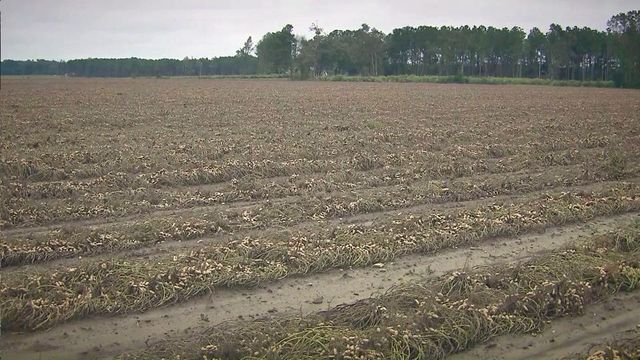Floods, mud stall harvest for NC farmers
As the clouds parted after weeks of rain Tuesday, Gov. Pat McCrory visited farms where crops of peanuts, soybeans and corn were being readied for harvest. The muddy mess left behind by all the rain means most farmers won't be able to get heavy equipment into the fields to help with that harvest.
Posted — UpdatedIn a visit to the peanut farm of Dan Ward, McCrory asked about manual labor. Ward said it'd be tough to find people willing to do the hard work, and it was likely he'd lose 75 to 80 percent of this year's crop, or about $1,000 per acre over his 320 acres of peanuts.
Ward has crop insurance, but it's likely not enough.
"If you get a high rate of crop insurance," he said, "it costs so much. We don't usually have these disasters. We haven't had a peanut crop failure since I've been paying attention."
From the coast to the mountains, farmers of apples, cotton, soybeans and sweet potatoes have a similar story.
"We've got to do everything we can to help them," McCrory said. "Not only does it impact these farmers, it impacts these communities and counties."
In the morning, McCrory took an aerial tour over the beaches of Brunswick County.
"Good news," he said, "I saw people out on beaches this morning."
"I want to thank you, sheriff," he said. "We've learned some lessons here and will continue to look at ways we can improve."
Brian Watts, Brunswick County emergency services director, cautioned residents and visitors to use care in venturing out, noting that some roads remained flooded and the water could rise again as flooding upstream flows to the sea.
"Please don't ignore the signs," McCrory said. "Driving through the water could kill you, and we don't want that. If it says it's closed, it's closed."
McCrory noted that, while North Carolina began cleaning up from the flood, the state was also making plans to help those in South Carolina who were harder hit.
"One major goal to help our neighbors to our south," he said. "We will do everything we can to help. They're our partners and friends."
In addition to offering Fort Bragg as a supply staging headquarters for the Federal Emergency Management Agency, North Carolina has sent four Blackhawk helicopters to help in the search and rescue effort in South Carolina, McCrory said.
• Credits
Copyright 2024 by Capitol Broadcasting Company. All rights reserved. This material may not be published, broadcast, rewritten or redistributed.






